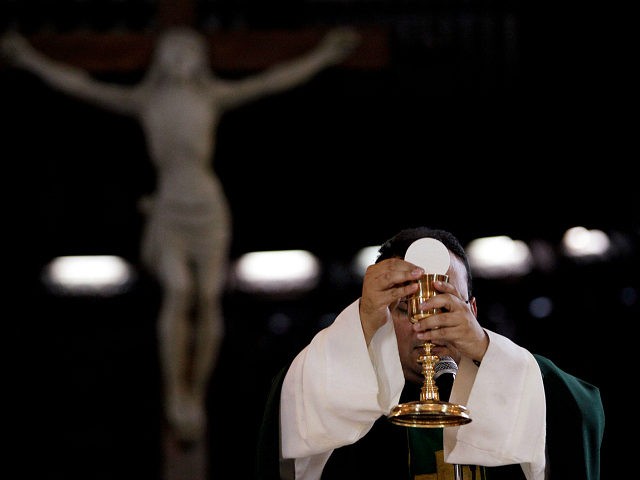Pope Francis reiterated traditional Catholic doctrine Wednesday, reminding pilgrims that no one in a state of mortal sin should receive Holy Communion.
“We know that whoever has committed a serious sin should not receive Holy Communion without having first obtained absolution in the sacrament of Reconciliation,” the Pope said during his weekly General Audience at Saint Peter’s in the Vatican.
“May Lent be an occasion to take advantage of the latter,” he added, “making a good confession and encountering Christ in Holy Communion.”
The pope’s insistence on worthiness to receive Communion seems to walk back — or at least complement — a favorite maxim of his, that the Eucharist “is not a prize for the perfect but a powerful medicine and nourishment for the weak.”
Some have interpreted these words as a justification for receiving Communion even when aware of having committed a serious sin, as a “medicine,” which the pope expressly denied Wednesday. In the case of grave sin, the only “medicine” is confession, he said.
Unlike many other Christians, Catholics believe that the Eucharistic bread received in Holy Communion is not just a symbol, but actually is the body and blood of Christ, taking at face value the words of Jesus: “My flesh is true food and my blood is true drink.”
This leads them to approach Communion only when in a “state of grace,” or friendship with God, according to the words of Saint Paul: “Whoever, therefore, eats the bread or drinks the cup of the Lord in an unworthy manner will be guilty concerning the body and blood of the Lord.”
The great scholar and saint Thomas Aquinas, drew an analogy between the spiritual life of the soul and the natural life of the body, noting that the Eucharist is food, but adding that food only helps the living. The one who commits a mortal sin “is not alive spiritually, and so he ought not to eat the spiritual nourishment, since nourishment is confined to the living.”
The Church sees the state of grace — the life of the soul — to be a minimum condition or a low bar to be able to fruitfully receive the Eucharist. As Aquinas says further: “Mortal sin alone necessarily prevents anyone from partaking of this sacrament.”
Pope-watchers know that the style of Francis is often to say one thing and then in another moment say something else that completes or attenuates it. Only by drawing together his different expressions does one come to a fuller appreciation of his thought.
This can be frustrating, since some wish that he would simply state his complete thought with all the necessary nuances from the beginning, but for better or worse, this isn’t his way.
Follow Thomas D. Williams on Twitter Follow @tdwilliamsrome

COMMENTS
Please let us know if you're having issues with commenting.